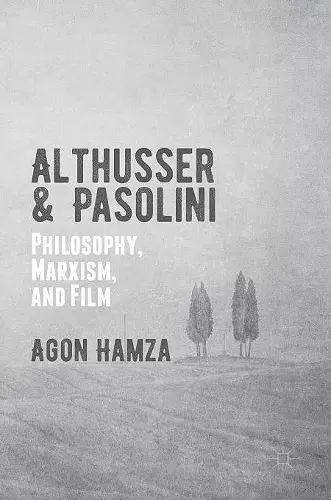Althusser and Pasolini
Philosophy, Marxism, and Film
Format:Hardback
Publisher:Palgrave Macmillan
Published:2nd Jun '16
Currently unavailable, and unfortunately no date known when it will be back
This hardback is available in another edition too:
- Paperback£74.99(9781349953981)

"Agon Hamza's book can only be described as an explosive mixture of politics and sexuality, of philosophy and art, of Marxism and Christianity. It reshuffles the cards so that nothing remains the same. The common thread of Christianity renders visible a new Althusser and a new Pasolini. I am grateful to live in a time when such books are written. They prove that thinking is not yet dead." (Slavoj Zizek, International Director, Birkbeck Institute for the Humanities) "As with Marxism generally, so too with Louis Althusser specifically: During roughly the past half-century, both ended up falling into undeserved disrepute and obscurity. However, amidst today's desperately needed reactivations of what Alain Badiou calls 'the idea of communism,' Althusser's concepts and problems must be revisited and put back to work. This is exactly what Agon Hamza delivers. Hamza's stellar intervention produces both a surprising historical reappraisal of Althusser as a Christian-Hegelian emancipatory thinker as well as a neo-Althusserianism addressing the most pressing socio-political challenges of the contemporary age." (Adrian Johnston, Professor of Philosophy, University of New Mexico at Albuquerque, USA)
Agon Hamza offers an in-depth analysis of the main thesis of Louis Althusser’s philosophical enterprise alongside a clear, engaging dissection of Pier Paolo Pasolini’s most important films. Pasolini’s films are a treasure-trove of Althusserian thought, and Hamza ably employs Althusserian terms in his reading of the films. Agon Hamza offers an in-depth analysis of the main thesis of Louis Althusser’s philosophical enterprise alongside a clear, engaging dissection of Pier Paolo Pasolini’s most important films. There is a philosophical, religious, and political relationship between Althusser’s philosophy and Pier Paolo Pasolini’s films. Hamza teases out the points of contact, placing specific focus on critiques of ideology, religion, ideological state apparatuses, and the class struggle. The discussion, however, does not address Althusser and Pasolini alone. Hamza also draws on Spinoza, Hegel, Marx, and Žižek to complete his study. Pasolini’s films are a treasure-trove of Althusserian thought, and Hamza ably employs Althusserian terms in his reading of the films. Althusser and Pasolini provides a creative reconstruction of Althusserian philosophy, as well as a novel examination of Pasolini’s film from the perspective of the filmmaker’s own thought and Althusser’s theses.
ISBN: 9781137566515
Dimensions: unknown
Weight: unknown
202 pages
1st ed. 2016